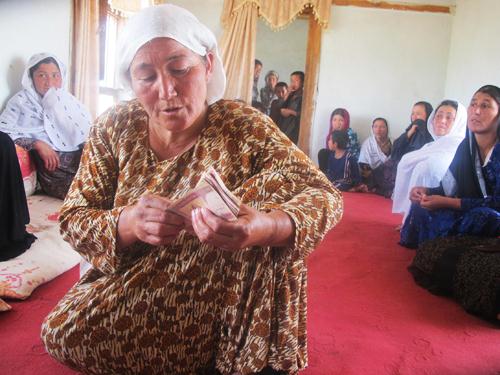
Many women were able to participate in our micro-credit program
After extensive Taliban conflict and severe drought, communities in northern Afghanistan have had no choice but to either flee their homes or live in extreme poverty. In such circumstances, economic opportunity is hard to come by. Without means to continue the agricultural activities that many families rely on for income, many men have sought work in Iran to support their families, but have not returned.
Seeking to bring hope and economic opportunity back into the region, our Sustainable Livelihoods and Agriculture Enterprise Development (SLAED) program provided 876 small loans to 10 communities in northern Afghanistan to support crop farming and expand kitchen gardens.
Many of the loans were provided in areas where SFL had already rehabilitated roads, irrigation systems, and agricultural training. As a result, the 10 communities where the original micro-loans were provided had good access to markets and the knowledge to grow new and higher value crops. For many women who participated in the SLAED program, loans have provided opportunity to purchase livestock, generating new avenues of income over winter when there is no activity or money earned from farming. For Pari*, being able to purchase chickens has made a big difference to her family and village. As she shared,

Pari and her new chickens
“Before SFL staff came here, our village was forgotten and no one was thinking about us and our problems. Even the government did not listen to us. Since SFL came here many things have changed in our village, they distributed chickens and goats and built bridges and roads.
Women in our village face many problems. We have many economic, social & family problems. When SFL distributed hens the women became very optimistic that they could sell the eggs and buy basic necessities. The many men who are hired to work on the bridges have brought many hopes to desperate families. Many people leave Afghanistan if they can’t find work. They go to Iran and it has happened to many families in our village. In the end, many of them have lost their husbands, sons and fathers.
We migrated to Iran during the Taliban. We became immigrants and lost everything and when we came back to the village we had nothing. My husband worked in the city as a laborer. Unfortunately because of the drought which lasted three years he couldn’t find any work and he wanted to go back to Iran to work. Luckily when SFL started the project in our village, my husband became busy on the bridges and I am busy with hens.
We feel our village is better than before. Now, people are having a good life. The goats and the chicken are good for our village and my chickens have multiplied. I received 15 chickens but now I have 33 chickens.
I feel happier than before and I am able to purchase household items with the eggs I sell.”
*Name changed to protect identity

Women awaiting their micro-loan payment















